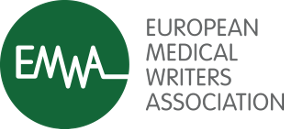AMWA‒EMWA‒ISMPP Joint Position Statement
on the Role of Professional Medical Writers
Introduction
This joint position statement of the American Medical Writers Association (AMWA), the European Medical Writers Association (EMWA), and the International Society for Medical Publication Professionals (ISMPP) describes the appropriate role of professional medical writers in the development of medical and scientific publications, including:
-
articles and supplementary content (eg, video abstracts) for publication in peer-reviewed journals
-
abstracts, posters, and oral presentations for dissemination at scientific congresses.
This joint position statement is in line with up-to-date guidelines from several other international organizations.1–13
Responsibilities of professional medical writers
Professional medical writing support helps authors and sponsors to disclose their research in peer-reviewed journals and at scientific congresses in an ethical,14 accurate,15,16 and timely17 manner, with the ultimate aim of advancing patient care.
Professional medical writers have extensive knowledge of ethical publication guidelines.18,19 When assisting authors with communication of the results of company-sponsored research, they must:
-
follow Good Publication Practice (GPP3) guidelines and International Committee of Medical Journal Editors (ICMJE) recommendations1,2
-
consult appropriate reporting guidelines (eg, CONSORT20 and others collated by the EQUATOR network21)
-
ensure that the authors and sponsors are aware of their obligations under these guidelines1,2,20,21
-
keep up to date with advances in medical communications ethics and best practices.
Responsibilities of authors who collaborate with professional medical writers
Authors who choose to collaborate with a professional medical writer on manuscripts or congress presentations must:
-
ensure that they, as authors, have access to all relevant information (eg, protocols, statistical analysis plans, statistical analyses, and clinical study reports)
-
provide intellectual input before writing commences and throughout content development
-
ensure that the final text fully reflects the views of, and is approved by, all authors
-
affirm the appropriateness of the final choice of journal or congress
-
acknowledge the provision of medical writing support, including the nature of the support, and the name, highest relevant qualifications (eg, degree or professional credential), and affiliation of the professional medical writer accountable for the support provided (see Box), and acknowledge the funding sources for the provision of medical writing support
-
recognize as a co-author all contributors (including a professional medical writer) who meet the ICMJE authorship criteria.1
Box. Example of template disclosure statement for professional medical writing support.
“The authors thank [name and qualifications] of [company, city, country] for providing medical writing support/editorial support [specify and/or expand as appropriate], which was funded by [sponsor, city, country] in accordance with Good Publication Practice (GPP3) guidelines (http://www.ismpp.org/gpp3).”
1. References
-
International Committee of Medical Journal Editors. Recommendations for the conduct, reporting, editing, and publication of scholarly work in medical journals. http://www.icmje.org/icmje-recommendations.pdf. Published December 2016. Accessed December 28, 2016.
-
Battisti WP, Wager E, Baltzer L, et al. Good publication practice for communicating company-sponsored medical research: GPP3. Ann Intern Med. 2015;163:461–464.
-
Clark J, Gonzalez J, Mansi B, et al. Enhancing transparency and efficiency in reporting industry-sponsored clinical research: report from the Medical Publishing Insights and Practices initiative. Int J Clin Pract. 2010;64:1028–1033.
-
World Medical Association. Declaration of Helsinki: ethical principles for medical research involving human subjects. http://www.wma.net/en/30publications/10policies/b3/. Updated October 2013. Accessed December 20, 2016.
-
World Health Organization. Statement on public disclosure of clinical trial results. http://www.who.int/ictrp/results/WHO_Statement_results_reporting_clinical_trials.pdf?ua=1. Published 2015. Accessed November 26, 2016.
-
International Federation of Pharmaceutical Manufacturers and Associations (IFPMA), European Federation of Pharmaceutical Industries and Associations (EFPIA), Japanese Pharmaceutical Manufacturers Association (JPMA), Pharmaceutical Research and Manufacturers of America (PhRMA). Joint position on the publication of clinical trial results in the scientific literature. http://www.efpia.eu/uploads/Modules/Documents/20100610_joint_position_publication_10jun2010.pdf. Published 2010. Accessed November 25, 2016.
-
Pharmaceutical Research and Manufacturers of America. Principles on conduct of clinical trials: communication of clinical trial results. http://www.phrma.org/sites/default/files/pdf/042009_clinical_trial_principles_final_0.pdf. Updated December 2014. Accessed December 20, 2016.
-
Hamilton CW, Royer MG. AMWA position statement on the contributions of medical writers to scientific publications. AMWA J. 2003;18:13–16.
-
American Medical Writers Association. Code of ethics. http://www.amwa.org/amwa_ethics. Updated June 2008. Accessed September 30, 2016.
-
Jacobs A, Wager E. European Medical Writers Association (EMWA) guidelines on the role of medical writers in developing peer-reviewed publications. Curr Med Res Opin. 2005;21:31722.
-
Norris R, Bowman A, Fagan JM, et al. International Society for Medical Publication Professionals (ISMPP) position statement: the role of the professional medical writer. Curr Med Res Opin. 2007;23:1837–1840.
-
International Society for Medical Publication Professionals. Position statement: the role of the professional medical writer. http://www.ismpp.org/assets/docs/Inititives/advocacy/ismpp_ghost_writing_vs_professional_medical_writing_oct_2011.pdf. Published 2011. Accessed September 30, 2016.
-
International Society for Medical Publication Professionals. Code of ethics. http://www.ismpp.org/ethics. Updated November 1, 2016. Accessed November 25, 2016.
-
Woolley K, Lew RA, Stretton S, et al. Lack of involvement of medical writers and the pharmaceutical industry in publications retracted for misconduct: a systematic, controlled, retrospective study. Curr Med Res Opin. 2011;27:117582.
-
Jacobs A. Adherence to the CONSORT guideline in papers written by professional medical writers. Write Stuff. 2010;19:196199.
-
Gattrell WT, Hopewell S, Young K, et al. Professional medical writing support and the quality of randomised controlled trial reporting: a cross-sectional study. BMJ Open. 2016;6:e010329.
-
Shah S, Nair S, Patil A, et al. Role of medical publication professional in timely dissemination and transparent reporting of clinical data. Curr Med Res Opin. 2016;32(Suppl 1):S12.
-
Wager E, Woolley K, Adshead V, et al. Awareness and enforcement of guidelines for publishing industry-sponsored medical research among publication professionals: the Global Publication Survey. BMJ Open. 2014;4:e004780.
-
Marusic A, Hren D, Mansi B, et al. Five-step authorship framework to improve transparency in disclosing contributors to industry-sponsored clinical trial publications. BMC Med. 2014;12:197.
-
Schulz KF, Altman DG, Moher D. CONSORT 2010 statement: updated guidelines for reporting parallel group randomised trials. BMJ. 2010;340:c332.
-
Reporting guidelines for main study types. EQUATOR Network Web site. http://www.equator-network.org/. Accessed December 20, 2016.


 Deutsch
Deutsch Italiano
Italiano Français
Français Espanol
Espanol Romanian
Romanian Portuguese
Portuguese Hungarian
Hungarian Russian
Russian Farsi
Farsi Greek
Greek Hebrew
Hebrew Arabic
Arabic PDF Version: Joint Position Statement for Professional Medical Writers
PDF Version: Joint Position Statement for Professional Medical Writers